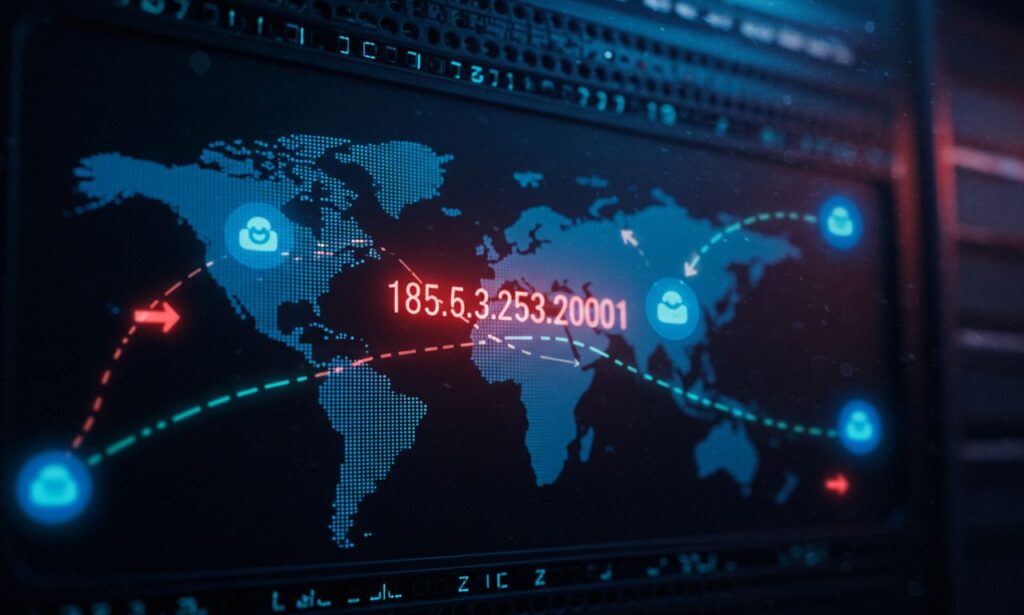In the vast digital landscape, every device connected to the internet has a unique identifier known as an IP address. Imagine it as your home address in the online world. Among these addresses lies one that stands out: 185.63.253.2001. But what does this collection of numbers mean? How does it fit into the intricate web of internet communication and security? Understanding IP addresses is crucial for anyone navigating today’s technology-driven environment.
Whether you are curious about how data travels or want to know more about protecting your online identity, exploring IP addresses can unlock valuable insights into our digital lives. Join us on this journey as we delve deeper into 185.63.253.2001 and discover its significance in connecting people and devices around the globe.
What is 185.63.253.2001?
185.63.253.2001 is an IP address that falls within the range of public IPv4 addresses. It serves as a unique identifier for devices connected to the internet.
This specific address may belong to a particular organization or service provider, allowing them to manage their network efficiently.
IP addresses like 185.63.253.2001 help route information and data packets across the web, ensuring seamless communication between users and services.
Understanding this address can be crucial for troubleshooting connectivity issues or enhancing online security measures.
When you encounter 185.63.253.2001 in your digital environment, it often indicates where certain activities are originating from or being routed through on the internet landscape.
It’s fascinating how every digit holds significance in defining connections worldwide while maintaining privacy and security standards.
Types of IP Addresses
IP addresses come in several types, each serving a distinct purpose. The most common are IPv4 and IPv6.
IPv4 consists of four sets of numbers separated by periods, like 192.168.1.1. It has been the standard since the early days of the internet but is running out of available addresses due to growing demand.
IPv6 was introduced to solve this problem, featuring a longer format with eight groups of hexadecimal characters separated by colons, such as 2001:0db8:85a3:0000:0000:8a2e:0370:7334.
Static IPs remain constant and are ideal for hosting servers or websites, while dynamic IPs change frequently and are typically assigned by ISPs to home users for better resource management.
Public IPs can be accessed over the internet, whereas private IPs exist within local networks only. Each type plays a unique role in maintaining efficient communication across the web.
How IP Addresses Work
IP addresses are essential for identifying devices on a network. Each device connected to the internet has a unique IP address, like a home address in the digital world.
When you send data online, it travels through various routers and servers. These devices use your IP address to route information correctly. Without this system, messages would get lost or misdirected.
There are two primary versions of IP addresses: IPv4 and IPv6. IPv4 consists of four numbers separated by periods, while IPv6 uses eight groups of hexadecimal digits. The shift toward IPv6 is due to the growing number of devices needing unique identifiers.
In essence, an IP address acts as both sender and receiver’s identifier, ensuring that communication flows smoothly across the vast expanse of the internet. Understanding how this mechanism operates enhances our grasp of network functionality.
Importance of IP Addresses in Internet Communication
IP addresses are the backbone of internet communication. Every device connected to the web needs a unique identifier to send and receive data. This is where IP addresses come into play.
Without them, devices wouldn’t know where to direct information packets. Imagine sending a letter without knowing the recipient’s address; it simply wouldn’t reach its destination.
Moreover, IP addresses allow for efficient routing of traffic across complex networks. They ensure that your request reaches the correct server while also verifying responses on return journeys.
The structure of an IP address holds vital information about network location as well. This helps in managing connectivity issues and optimizing performance when accessing websites or online services.
In essence, they are crucial for seamless interaction between users and various platforms across the vast internet landscape.
The Role of IP Address in Network Security
An IP address, like 185.63.253.2001, plays a crucial role in network security. It acts as a unique identifier for devices on the internet or within a local network. This identification is essential for managing traffic and ensuring that data reaches the correct destination.
Cybersecurity measures often rely on monitoring IP addresses to detect unusual activity. For instance, if a device suddenly sends an excessive number of requests from one address, it raises red flags for potential attacks.
Firewalls use IP addresses to allow or block traffic based on established rules. By filtering out suspicious IPs, they help protect sensitive data from unauthorized access.
Additionally, geolocation services can trace an IP’s origin and flag malicious sources accordingly. This proactive approach adds another layer of defense against cyber threats while enabling organizations to respond swiftly when risks arise.
How to Find Your IP Address
Finding your IP address is a straightforward process. Whether you’re using a computer or mobile device, it only takes a few clicks.
For Windows users, simply open the Command Prompt. Type “ipconfig” and hit Enter. Your IP address will be displayed under the “IPv4 Address” section.
On Mac, go to System Preferences, then select Network. Choose your active connection and look for the IP address listed in the details.
If you’re on a smartphone, it’s even easier. For Android devices, head to Settings > About Phone > Status. iPhone users can find their IP by going to Settings > Wi-Fi and tapping on the connected network.
Alternatively, several websites offer quick access to your public IP address with just one click—no technical knowledge required!
Potential Issues and Solutions with IP Addresses
IP addresses can sometimes present challenges. One common issue is IP address conflicts, which occur when two devices are assigned the same address. This leads to network disruptions and connectivity problems.
Another problem arises with dynamic IP addresses. They change frequently, making it difficult for users who need a stable connection for remote work or gaming.
Security vulnerabilities also exist. Unprotected IP addresses can be targets for hackers seeking unauthorized access to networks and sensitive data.
Solutions vary depending on the issue at hand. For conflicts, using a static IP address can eliminate confusion among devices. Employing Virtual Private Networks (VPNs) enhances security by masking an original IP address and encrypting data traffic.
Regularly updating router firmware is another proactive measure against potential threats associated with unsecured addresses. Awareness of these issues helps maintain smoother communication online.
Conclusion
Understanding the significance of IP addresses is crucial in our digital world. The specific address 185.63.253.2001 serves as a gateway to various online services and resources, illustrating how vital these numerical identifiers are for connectivity.
Different types of IP addresses exist, each serving its own purpose within networks. From public to private IPs, they play an essential role in routing data efficiently across the internet.
How these addresses operate behind the scenes can be quite fascinating as well. They allow devices to communicate seamlessly while ensuring information reaches its intended destination with minimal delay.
The importance of IP addresses extends beyond mere communication; they are integral to network security measures too. Understanding them helps individuals and organizations protect their data from potential threats.
Finding your own IP address can be done easily through various methods, allowing you to troubleshoot any connectivity issues or enhance your online presence safely.
However, challenges related to IP addresses may arise occasionally—issues like conflicting assignments or misconfigurations often require effective solutions for smooth operation.
Exploring 185.63.253.2001 sheds light on how interconnected we truly are in this technological landscape while emphasizing the fundamental nature of IP addressing in modern communication systems.


